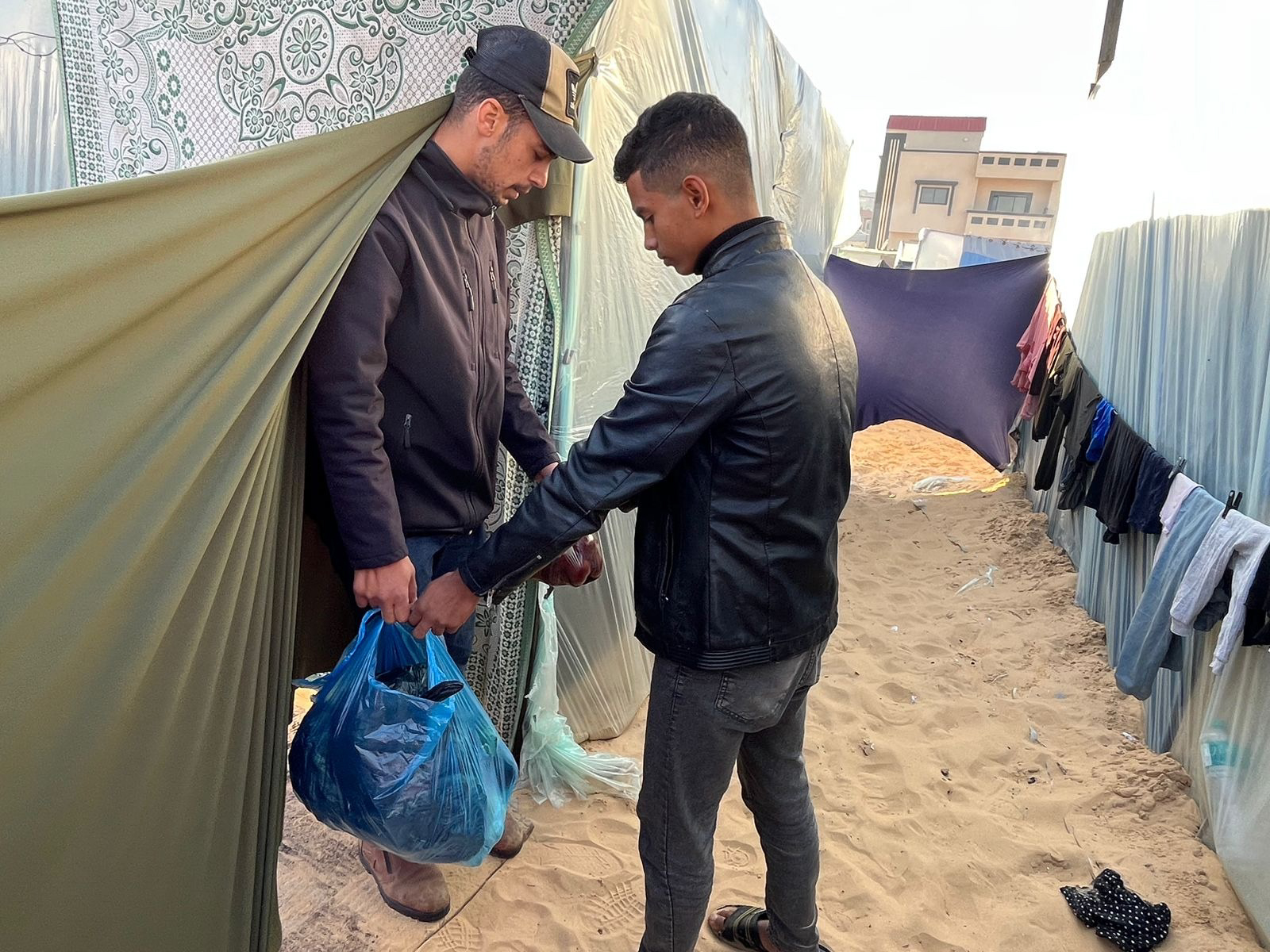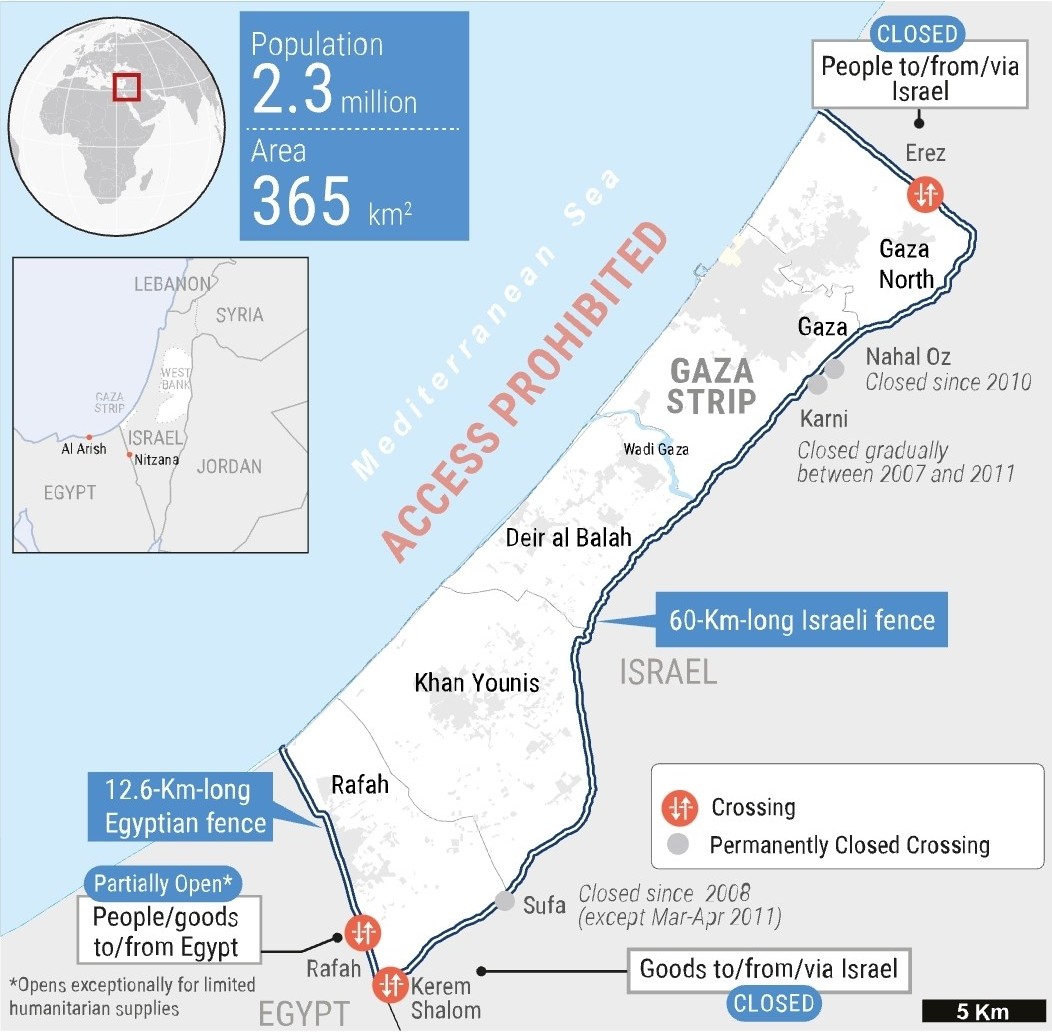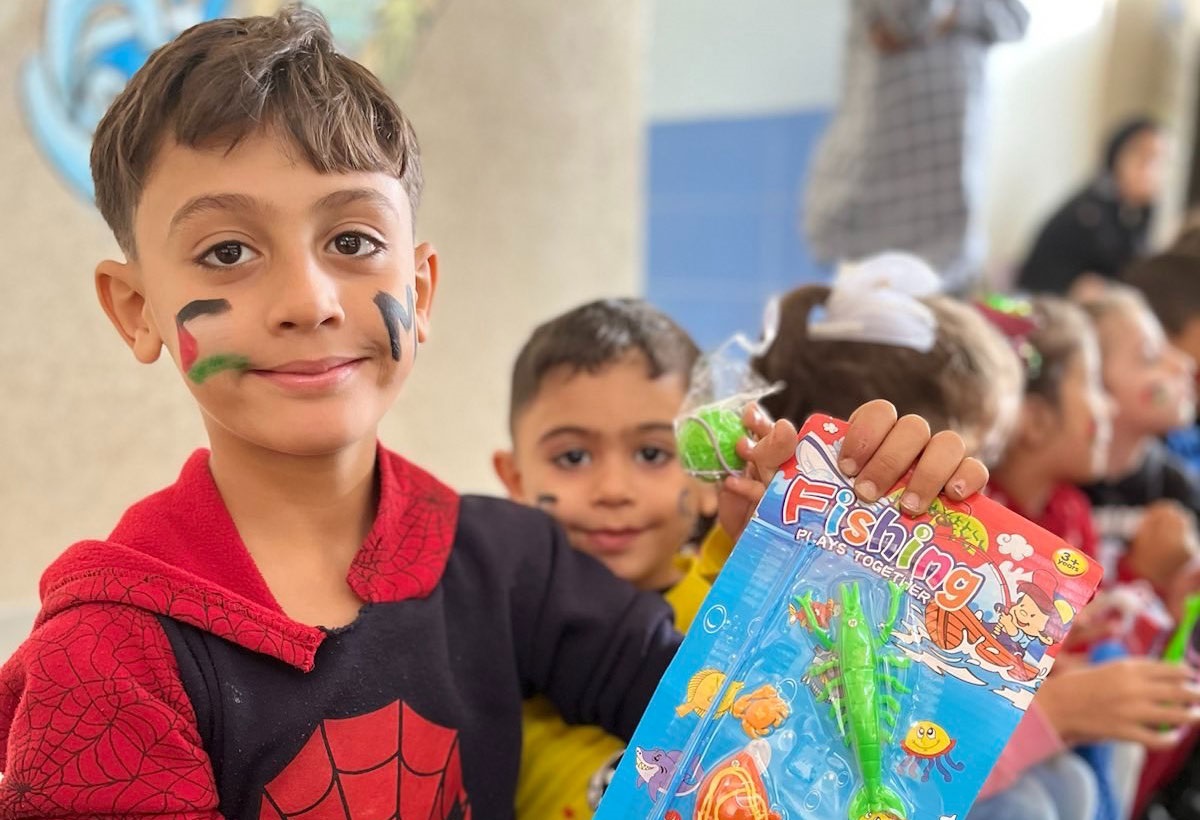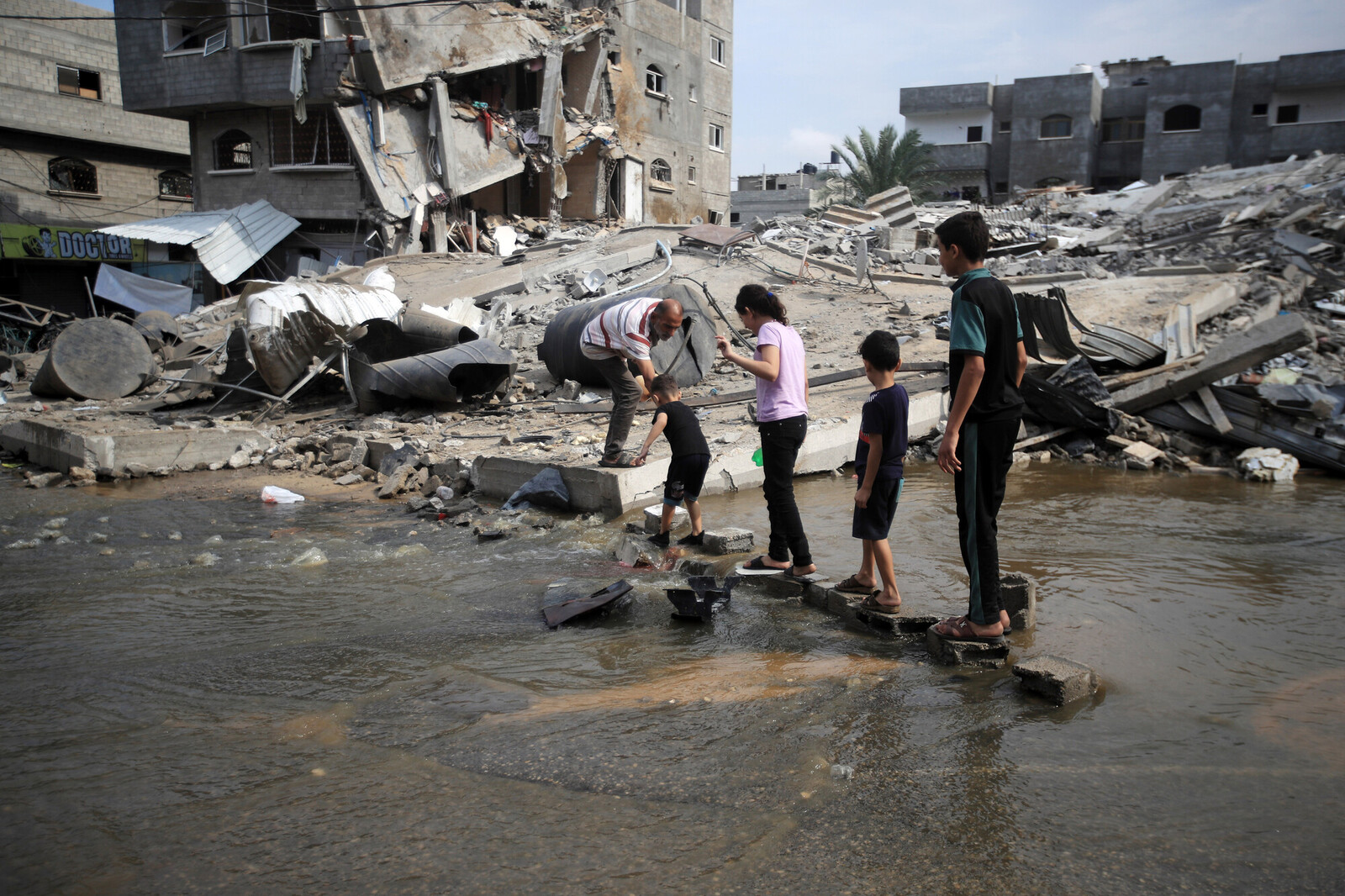
On Dec. 11 and 12, AFSC and partners distributed parcels of vegetables to more than 2,500 people in south Gaza. Belal Khalili
AFSC has offices and staff in Jerusalem, Gaza, the West Bank, and Jordan. Today, we are providing humanitarian relief to Palestinians in Gaza and the West Bank—as we advocate for a permanent cease-fire and protection for the Palestinian people.
Here’s the latest from our Middle East team on the situation facing Palestinians and how AFSC is responding to the crisis.
By the numbers: The human toll since Oct. 7
GAZA
• 21,320+ killed (8,200 children)
• 10,000+ buried under the rubble
• 55,603 injured
• 1.93 million displaced
• 6,000+ arrested
• 313,000 homes destroyed or damaged
• 27 out of 36 hospitals not functioning
WEST BANK
• 313 killed
• 3,450 injured
• 1,008+ displaced
• 4,800 arrested
• 365 homes destroyed
Sources: Gaza Ministry of Health, UNOCHA

Source: U.N. OCHA
The humanitarian situation in Gaza
The situation in Gaza is catastrophic and continues to worsen exponentially. The total population of Gaza—2.3 million Palestinians—is in urgent need of help. If we want to save something of Gaza, we need a total cease-fire, the immediate opening of all crossings and the unconditional access of humanitarian aid and commercial goods, and the restoration of all services (water, electricity, and fuel access) that have been cut off by Israel.
More forced displacement and severe overcrowding: As the Israeli military intensifies its attacks on Gaza, more people have fled south to Rafah and Deir el-Balah. It is estimated that over 1.3 million internally displaced people are in Rafah alone. The severe overcrowding of these two locations—together with the impeded access to health and medical supplies, the lack of food and clean water in particular, and poor living conditions—have increased the risk of deaths to many.
Due to the extreme overcrowding in Rafah city, the roads are so congested that trucks cannot operate, further hampering efforts to distribute humanitarian aid.
Hunger and starvation: People are starving to death. The first case of a person dying of starvation was reported on Dec. 13. UNRWA’s head, Philippe Lazzarini, stated, “Hunger has now emerged over the last few weeks and we meet more and more people who haven’t eaten for one, two or three days.”
Nine out of 10 families in some areas spent a full day and night without any food at all, according to a survey taken by the World Food Programme during the pause in hostilities. When asked how often this happened, the answer was that for up to 10 days in the past month, they had not eaten food.
Lack of humanitarian access: We need unconditional humanitarian access to Gaza now. Today, there is just a fraction of the needed food supplies coming in, a fatal absence of fuel, interruptions to communications systems, and no security for staff or for the people.
The only entry point of aid to Gaza is the Rafah border with Egypt. All other entry points are now closed. Israeli authorities control what aid can enter Gaza. Only food, water, medicine, some winterization items, and a limited quantity of fuel have been authorized by Israel to enter Gaza.
Before Oct. 7, about 500 trucks of aid would enter Gaza daily, which was insufficient. Since Oct. 21, only an average of 100 trucks per day have been allowed to enter daily.
Buildings and infrastructure destroyed: Extensive bombardment has resulted in the destruction and damage of almost all buildings, alongside widespread damage to roads and essential infrastructure such as power systems and distribution networks, and water storage tanks, pipes, supply networks, and drainage channels. This has prevented access to services and infrastructure critical to meet basic needs.
A health system that has collapsed: Only 4 hospitals in the North were still operating partially as of Dec. 3. At this point, no one is performing operations and the facilities with medical staff, patients, relatives, and people taking shelter are still to this date under siege. Hospitals have been raided, and health care personnel and patients have been killed, beaten, and detained.
In the south, only two major hospitals are operating in the south. However, only one can be accessed and is operating beyond its capacity. The other hospital—in Khan Younis—is no longer accessible because of repeated bombardments in the vicinity.
None of the hospitals in the north can perform surgeries.
Rising public health concerns: The lack of medical supplies, clean water, food, and other essential supplies—combined with poor living conditions, severe overcrowding in shelters and the disruption of health, water, and sanitation systems—have increased the risk of communicable diseases. There are grave concerns over waterborne diseases due to water consumption from unsafe sources. Diarrhea and respiratory conditions are alarming. And there are also rising cases of influenza, chicken pox, meningitis, jaundice, impetigo acute respiratory infections, skin infections, and hygiene-related conditions like lice.
By Dec. 12, the Ministry of Health had documented 360,000 cases of infectious diseases in shelters, noting that the actual number is believed to be higher. It has also identified 14 diseases with epidemic potential and fear an outbreak due to the huge shortage of medicines and vaccinations to mitigate infectious diseases.
Vulnerable groups in difficult conditions: Several groups are especially vulnerable due to the lack of proper shelter, health and basic services. That includes people with disabilities; women who are pregnant, have recently given birth, or are breastfeeding; people who are recovering from injuries or surgeries; seniors; children, especially newborns; and those with compromised immune systems.

At a shelter in Gaza, AFSC and partners organized an open day of activities for children. Mayar Ramlawi
AFSC’s emergency relief efforts
In Gaza, AFSC has provided emergency relief to displaced people in the Khan Yunis and Rafah regions of Gaza. In recent weeks, our staff, working with partners, have so far distributed:
• 250 parcels of vegetables to families living in tents, reaching more than 2,500 people.
• 502 food parcels for 3,600 people with easily prepared items such as luncheon meat, canned cheese, and jam that provide enough to feed a family for two days.
• 770 meals of rice and meat for families, serving 2,370 people.
• 500 family hygiene kits with items such as soap, shampoo, toothbrushes, toothpaste, hairbrushes, nail clippers, ear cotton, wipes, underwear, women's hygiene products, and other sanitary supplies.
We are also sending additional aid through Egypt into Gaza when Israeli authorities allow it. So far, we have procured two trucks of food and one truck of medicine. Now we’re procuring another truck with blankets and winter clothes to help displaced families.
Read more about AFSC’s emergency relief.
In the West Bank, Palestinians are increasingly facing arbitrary killings and detentions, home demolitions, daily Israeli army raids, and other human rights violations. Over 150,000 workers from the West Bank, previously employed in Israel and settlements, have lost their jobs due to firing or restricted crossings. There are also thousands of Gaza patients and workers stranded in the West Bank who have not been allowed to return to Gaza.
In recent weeks, AFSC has supported 168 patients from Gaza and their relatives who were receiving treatment in Jerusalem and were forced to relocate to Ramallah during the war. We assisted patients with medical needs and winterization items. Working with partners, we are now providing patients and their families hot meals daily.
How you can help
Contact Congress today: Urge your representatives to call for a total cease-fire and humanitarian access to Gaza.
Give to AFSC’s Gaza emergency response: Your donation will bring humanitarian relief and support ongoing efforts to stop the violence, address its root causes, and build conditions for peace.
